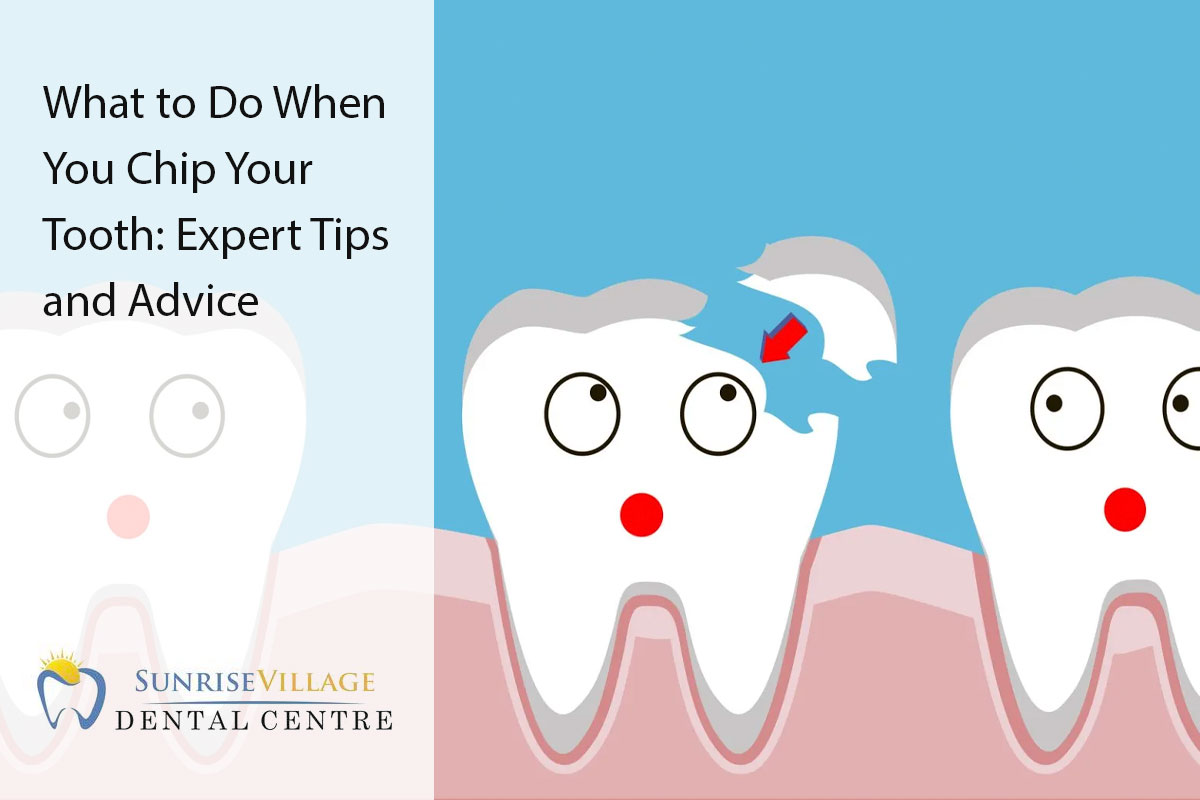
Accidents happen, and sometimes they result in a chipped tooth. Whether it’s a small chip or a significant break, dealing with a chipped tooth can be both physically and mentally distressing. But fear not! We will provide you with expert tips and advice on what to do when you chip your tooth.
Common causes of tooth chipping
Chipped teeth are a common dental problem that can happen for various reasons. Here are some of the main causes:
- Biting Down on Hard Foods or Objects: Items like ice cubes, hard candies, nuts, and popcorn kernels can create sudden impacts that crack or chip tooth enamel.
- Trauma to the Face or Mouth: Forceful impacts from sports injuries, falls, or accidents can lead to cracks or breaks in teeth.
- Teeth Grinding (Bruxism): Grinding and clenching your teeth, often during sleep, can wear down enamel and increase the risk of chipping.
- Poor Dental Hygiene: Infrequent dental check-ups can result in plaque and tartar buildup, weakening the enamel and making it more prone to damage.
Signs and symptoms of a chipped tooth
When you chip a tooth, the immediate signs and symptoms can be quite noticeable. Here are some common indicators:
- Visible Damage: Look for a crack or break in the tooth’s surface, which can range from a small chip to a larger fracture.
- Discomfort or Pain: The exposed area may be sensitive to hot, cold, or touch, making it uncomfortable to eat or drink. Increased sensitivity can also occur when brushing or flossing.
- Changes in Appearance: A small chip may not significantly alter your smile, but a larger fracture can create an uneven or jagged edge that others may notice.
- Lack of Immediate Pain: Sometimes, a chipped tooth may not cause any pain. However, even a small chip can make the tooth more vulnerable to further damage or infection.
Home remedies for temporary relief
While seeking professional dental care is the best option for a chipped tooth, here are some home remedies you can try for temporary relief until you can see a dentist:
- Cold Compress:
- Wrap ice in a clean cloth.
- Hold it against your cheek near the chipped tooth for 10-15 minutes to reduce swelling and numb pain.
- Saltwater Rinse:
- Mix 1 teaspoon of salt in a cup of warm water.
- Gently swish the solution around your mouth, focusing on the chipped tooth to reduce inflammation and keep the area clean.
- Avoid swallowing the saltwater.
- Cover Sharp Edges:
- Use dental wax or sugarless chewing gum to cover the exposed area of the chipped tooth.
- This protects your tongue and cheek from irritation.
- Replace the wax or gum as needed and avoid chewing on that side of your mouth.
- Over-the-Counter Pain Relief:
- Take pain medications like ibuprofen or acetaminophen for discomfort.
- Follow dosage instructions on the packaging and do not exceed the recommended amount.
Treatment options for a chipped tooth
When you visit your dentist for a chipped tooth, they will evaluate the damage and recommend the best treatment option based on the severity of the chip, its location, and your overall oral health. Here are some common treatment options:
- Minor Chip or Crack:
- Dental Filling or Bonding: A tooth-coloured resin is applied to the affected area to restore the tooth’s shape and appearance. This is a quick, non-invasive procedure often completed in one visit.
- Moderate Chip:
- Dental Veneer: A thin, custom-made shell is bonded to the front of the tooth to cover the chipped area.
- Dental Crown: A cap that completely covers the visible portion of the tooth, providing a more comprehensive restoration.
- Severe Chip Exposing Inner Layers:
- Root Canal Treatment: Damaged or infected pulp is removed, and the tooth is sealed to prevent further issues. Afterward, the tooth may be restored with a filling, veneer, or crown.
- Significant Tooth Loss:
- Dental Implant: An artificial tooth root surgically placed into the jawbone, providing a stable foundation for a replacement tooth. This option restores function and appearance while preventing further complications.
Preventing future tooth chipping
Here are some simple tips to prevent future tooth chipping:
- Practice Good Oral Hygiene:
- Brush your teeth twice a day with a soft-bristled toothbrush.
- Floss daily to remove plaque and food particles.
- Schedule regular dental check-ups and cleanings.
- Manage Teeth Grinding:
- Discuss any teeth grinding with your dentist, especially at night.
- Consider getting a custom nightguard to protect your teeth.
- Wear Mouthguards for Sports:
- Use a properly fitted mouthguard when playing contact sports or doing physical activities.
- Be Careful What You Chew:
- Avoid chewing on hard items like ice, pens, or hard candies.
- Cut tough foods into smaller pieces to make them easier to chew.
- Avoid Bad Habits:
- Stop nail biting and refrain from using your teeth to open packages.
- Stay Hydrated and Eat Well:
- Drink plenty of water to keep your mouth moist and rinse away food particles.
- Eat a balanced diet with vitamins and minerals for healthy teeth.
Conclusion
Dealing with a chipped tooth can be stressful, but with the right guidance, you can manage the situation effectively. It’s crucial to take immediate action, whether the chip is small or significant, to protect your oral health and prevent complications. Remember, prompt attention and care can restore both the function and appearance of your teeth, allowing you to smile with confidence. Call Sunrise Village Dental at (604) 253-2433 to book your appointment.
